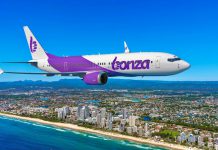Claims by Jetstar that consumer protections did not apply to some of its fares have cost the low-cost carrier $A1.95 million in fines.
The Federal Court ordered Jetstar to pay the fines after finding it made false or misleading representations about consumer guarantee rights under Australian Consumer Law.
The Australian Competition and Consumer Commission started proceedings on the issue in December 2018 and Jetstar at that time admitted liability.
The competition watchdog and the airline made joint submissions to the court that Jetstar should be fined the $A1.95m and pay some of the ACCC’s costs.
The court found that between April 2017 and March 2018, Jetstar misled passengers on its website about the rights and remedies available to consumers under consumer law.
The low-cost carrier said some fares were not refundable, and that consumers could only get a refund if they purchased a more expensive fare.
READ: Legacy carriers drive record North American airline satisfaction.
The court also found that Jetstar’s terms and conditions breached the ACL by claiming that consumer guarantee rights under the ACL did not apply to Jetstar’s flight services and that Jetstar’s obligation to provide refunds or replacement flights was limited.
“Jetstar’s representations were false or misleading because all flights come with automatic consumer guarantees that cannot be excluded, restricted or modified, no matter how cheap the fare,” ACCC Chair Rod Sims said.
“If a flight is canceled or significantly delayed, passengers may be entitled to a refund under the consumer guarantees. All consumers have the right to a remedy, such as a refund, if services are not supplied within a reasonable time.”
“Businesses simply cannot make blanket ‘no refunds’ statements, because they can mislead consumers into thinking they can never get a refund under any circumstances.”
Sims said the decision was a warning to all businesses that misleading consumers about their rights may result in multi-million-dollar penalties.
Jetstar agreed to a court-enforceable undertaking to make its practices and policies consistent with consumer law to review consumer complaints concerning flight delays or cancellations from April 10, 2017, to March 13, 2018.
It will offer refunds or other remedies to consumers that would have been entitled to those remedies.
A spokesperson said: “We take our obligations under Australian Consumer Law seriously and it was never our intention to mislead customers about the circumstances in which they could claim refunds.
“We worked closely with the ACCC during its review and in July last year made changes to our website and our conditions of carriage, to make sure it’s clear when customers are eligible for a refund.”
Qantas, Virgin and Tigerair Australia also gave court-enforceable undertakings in 2018 that they would ensure their policies and practices comply with their consumer guarantee obligations under the ACL.
Australian consumer rights apply to domestic flights, international flights departing Australia and international flights to Australia when booked through an Australian website.
However, whether or not a passenger is entitled to a refund depends on circumstances that include the length of the delay, the reason for a delay or cancellation and whether the airline was able to place a passenger on another flight within a reasonable time.
The ACCC warns that what constitutes a reasonable time may vary with each journey.
“If the airline refuses to fix the problem or takes too long, you may be able to have the service provided by another airline and recover the costs of the replacement flight,’ it adds.
The ACCC also revealed that Garuda Indonesia had been ordered to pay $A19 million for colluding on fees and surcharges for air freight services.
The federal court fine is the final piece in a long-running freight cartel case that has so far resulted in penalties of $A132.5m against 14 airlines, including Air New Zealand, Qantas, Singapore Airlines and Cathay Pacific.
The court fined Garuda $15m for its involvement between 2003 and 2006 in agreements that fixed the price of security and fuel surcharges, as well as a customs fee from Indonesia.
A further $4 million was ordered for the imposition and level of insurance and fuel surcharges from Hong Kong.
“Price fixing is a serious matter because it unfairly reduces competition in the market for Australian businesses and consumers, and this international cartel is one of the worst examples we have seen,” the ACCC’s Sims said.
Garuda was also ordered to pay the ACCC’s costs.
























